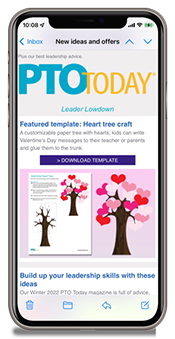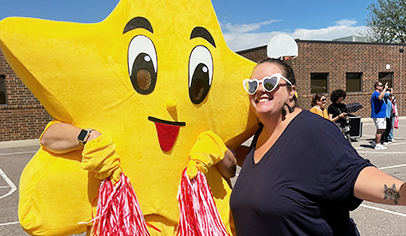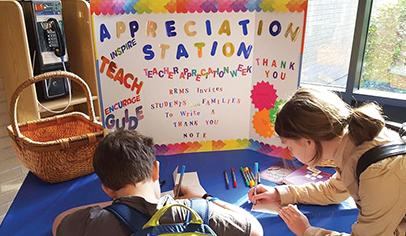More on our Economy Blues fundraising survey:
Complete Survey Results | PTO Leaders’ Comments
How PTOs Are Adapting to Hard Times | Hit Hard: How One Group Is Coping
Difficult economic times don’t have to mean the outlook is bleak for your parent group. Fundraising gets a lot of the attention, but it’s not at all the most important thing you do for your school. If your goal is to help build a community that supports students and teachers and allows them to do their best work, then getting more parents connected to the school and involved in their children’s education should be your group’s number one goal.
You may not be able to afford new computers or interactive whiteboards this year. But you can still organize a reading night or grandparents day or parents work party. The key to succeeding in tough times is to cut back strategically and to put the focus squarely on building community—which is where it should be anyway.
Start With the Big Picture
Reread your PTO’s mission statement, if you have one. If not, this is a good time to create one. Your mission statement should reflect the core values of your group. Use it to focus your plans. It’s quite possible that during years when resources were plentiful, your group adopted projects that were on the fringe of your mission.
Dan Freeman, president of the Sullivan Middle School PTO in Rock Hill, S.C., is dealing with this specific issue. “No one really knows how it got started, but the PTO has always raised money for the athletic booster club at Sullivan,” he says. “This year, we are encouraging the group to be self-sufficient so the PTO can focus on PTO business.”
By concentrating on your parent group’s mission, you’ll be putting your energy and limited resources in the places that will do the most good for your school.
Determine Priorities
If you need to scale back, prioritize first. Gather your officers and discuss the pros and cons of each project. Involve your principal, too, to make sure you’re in sync with her vision for the school.
There are a few projects that define your PTO and take precedence over everything else. You probably also can identify several events that you’re willing to cancel outright to preserve these traditions. Then there are the activities that are important and desirable but not essential to the viability of the PTO. Prioritize this middle group so you know which ones to focus on as resources become available.
Manage Your Money Closely
You should always be careful with financial data, but when money is tight it’s vital to use a good transaction control system. Be sure your treasurer is depositing money quickly, paying invoices on time, and keeping the balance up to date. Review the treasurer’s report carefully each month so you have time to make cuts if necessary.
Get Creative With Programming
If you’ve had to scale back the amount of money you give to teachers, perhaps you could sponsor a used book drive for the classrooms instead. Approach other organizations in your community about partnering on an event. For example, your local library might be eager to cosponsor Family Reading Night at your school. Both groups benefit while splitting the cost and volunteer demands of the event.
The Fox Elementary PTO in Macomb, Mich., is focusing on family nights that are inexpensive to produce and free for the guests. “With parents working 10- to 12-hour days, family together time is limited,” says president Doreen Chorazyczewski. “Our free fun nights allow them to come to the school and have a great time as a family at no cost to them.” Fox PTO’s plans include arts and crafts night, movie night, game night, and a Santa’s workshop.
Start Planning Early
Because resources are stretched, your PTO will need to start planning activities earlier than ever. Establish your committees sooner, delegate tasks effectively, and allow some flexibility in the schedule in case volunteers are pulled away for family or job obligations. It’s not likely that three or four super-volunteers will swoop in and handle this year’s music and art festival with just a couple weeks’ notice.
If your event depends on donations from community members, you will need to start soliciting much earlier than in the past. Most likely, donors will be less generous this year. It might take them longer than usual to commit to supporting your group. You want to have time to adjust your plans if donations are down. Before distributing invitations to the next Doughnuts With Dad event that promises dozens of door prizes, make sure your donations of those door prizes will come through.
Save on Bus Fuel
With volatile gas prices, many schools have cut back on traditional field trips. Look for outreach programs from local museums, public safety institutions, and music and arts societies. Bring the field trip experience to the school so the students don’t need to be transported. Your group could assist with arrangements, share the cost, and provide a snack to make the event special even though you never leave campus.
Use What You Have on Hand
Canceling a project can save some big bucks, but smaller savings add up, too. “Paper is normally a big expense for us,” says Chorazyczewski. “This year, we have implemented a half-sheet-only policy for our PTO flyers.”
Another idea is to use what you already have. Consolidate supplies that are scattered around the school or in members’ homes and prepare a comprehensive inventory list. You might find that your storage closet hides dozens of foam cups or stick-on nametags accumulated over the years. Notify your committee chairs and encourage them to “shop” from the inventory for their events.
Fill Gaps With Volunteers
The school itself is probably feeling the pinch of cutbacks. Reductions in staff might mean new volunteer opportunities for your PTO members. Check with your principal to see whether parents could help in the lunchroom, copier room, office, or media center. Given the choice, teachers might prefer help with classroom tasks rather than a spring luncheon.
Respect Your Volunteers’ Limits
In many communities, parents are working longer hours or taking second jobs to make ends meet. That can make your volunteer list shorter than ever. Assure parents that you will respect their time and that they won’t be bombarded with excessive meetings or unreasonable demands. Busy folks might squeeze out an hour or two for your PTO but can’t commit to a large-scale project. A volunteer pledge program like PTO Today’s 2 Hour Power makes it easier for parents to get involved. In this model, even small jobs are meaningful and all levels of volunteerism are celebrated.
Reach Out to New Volunteers
Tapping into new groups of volunteers might help you make up a shortage. A dads club can be a great way to expand involvement. Grandparents, too, are often interested in helping out. Today’s seniors are often just as capable as elementary school parents, although some may be more attracted to the less demanding jobs in your PTO. Design your outreach to grandparent volunteers specifically for that audience.
Also consider any underrepresented groups in your community. Does your school have a growing Spanish-speaking population? Perhaps it’s time for your communications to become bilingual so those parents feel more welcome. Does your school have a significant proportion of families who live far away? Consider developing some take-home projects for those parents so they don’t have to be physically at the school to get involved.
Stay Positive
Don’t despair if your parent group is feeling the pinch this year; you’re not alone. By focusing on activities that align with your core mission, using funds wisely, and getting creative, you can continue to do good things for the school. You’ll have an impact this year, and you’ll be ready to soar when the economy starts to improve.
Practical Money-Savers
- Repack bulk snacks into smaller servings for family nights.
- Reuse decorations from past events.
- Make your own banners using inexpensive bed sheets and spray paint.
- Make your own lawn signs from old campaign signs.
- Serve water in cups, not bottles.
- Use both sides of the paper to print flyers. Consider sending announcements and newsletters via email.
- Hold a used book drive for classroom libraries or the media center.
- Encourage “BYO” coffee for PTO meetings.
- Distribute flyers to oldest siblings only rather than to every single student.
- Use the school’s copier (with permission) rather than paying a commercial service.
- Use on-hand inventory first.
- Provide baby-sitting at PTO meetings and work sessions so parents of young children can get involved.
More on our Economy Blues fundraising survey:
Complete Survey Results | PTO Leaders’ Comments
How PTOs Are Adapting to Hard Times | Hit Hard: How One Group Is Coping























